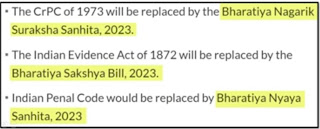The Central government introduced three new Bills in the Lok Sabha
to replace the Indian Penal Code (IPC), the Code of Criminal Procedure (CrPC)
and the Indian Evidence Act. The government moved to overhaul criminal laws in India
completely and also proposed a provision to replace the colonial-era
(British-era) sedition law with Section 150 of the Bharatiya Nyaya
Sanhita 2023, which deals with "acts endangering sovereignty, unity and
integrity of India."
Union Home
Minister Amit Shah introduced the Bharatiya Sanhita Suraksha Bill
2023 in Lok Sabha to replace the Indian Criminal Laws.
It seeks to revamp British-era laws. Home
Minister Amit Shah said that from 1860 to 2023, the country’s
criminal justice system functioned as per the laws made by the British.
Union Home Minister Amit Shah introduced
three bills in the Lok Sabha to replace the Indian Penal Code, Code of
Criminal Procedure and the Indian Evidence Act with the Bharatiya
Nyaya Sanhita, the Bharatiya Nagarik Suraksha Sanhita and the Bharatiya
Sakshya Bill respectively. With these three laws there will be a major
change in the criminal justice system in the country.
All
three bills were referred to a standing committee for review and recommendations.
All
three laws Indian Penal Code (IPC), Code of
Criminal Procedure (CrPC) and Indian Evidence Act will
be repealed. Home Minister Amit Shah said that the focus of those laws was
to protect and strengthen the British administration and the aim of laws
was to punish and not to give justice. Amit Shah said in Lok Sabha “By
replacing them, the new three laws will bring the spirit to protect the rights
of the Indian citizen. The aim will not be to punish, it will be to provide
justice. Punishment will be given to create a sentiment of stopping crime."
Sedition
Law
Section
124A of the IPC, which deals with sedition, says that, "Whoever by words,
either spoken or written, or by signs, or by visible representation, or
otherwise, brings or attempts to bring into hatred or contempt, or excites or
attempts to excite disaffection towards, the Government established by law in
India, shall be punished with imprisonment for life, to which fine may be
added, or with imprisonment which may extend to three years, to which fine may
be added, or with fine." The British Government introduced the Sedition Act in 1870. The Act gave the British supreme
authority to arrest or detains any person without a fair trial if he/she was
seen protesting against or criticizing the British.
Section
150 of the Nyaya Sanhita is longer and adds references to
"secession", "armed rebellion", "subversive
activities" and "separatist activities". The section 150 reads: "Whoever, purposely or knowingly, by
words, either spoken or written, or by signs, or by visible representation, or
by electronic communication or by use of financial means, or otherwise, excites
or attempts to excite, secession or armed rebellion or subversive activities,
or encourages feelings of separatist activities or endangers sovereignty or
unity and integrity of India; or indulges in or commits any such act shall be
punished with imprisonment for life or with imprisonment which may extend to
seven years and shall also be liable to fine."
Clause 69:
The Bharatiya
Nyaya Sanhita Bill 2023 tabled before Parliament includes
specific provisions to tackle offenses involving marrying a woman by concealing
identity, false promise of marriage, promotion and employment. The provisions
call for a 10-year imprisonment for these offenses. Such a section does
not exist in the IPC of 1860. Currently, the issue of false promises of
marriage to a woman and has sexual intercourse with her, is dealt under other
sections of the IPC.
Section 69 of the Bharatiya Nyaya Samhita pertains to
sexual intercourse under the false promise of marriage or deceitful means. The
section reads: “Whoever,
by deceitful means or making a promise to marry a woman without any intention
of fulfilling the same, and has sexual intercourse with her, such sexual
intercourse not amounting to the offense of rape, shall be punished with
imprisonment for a term which may extend to ten years and shall also be liable
to a fine."
Some
New proposed laws:
1. The
current sedition law will be completely repealed. Provisions under the sedition
law will be retained in Section 150 for acts of endangering the sovereignty,
unity and integrity of India.
2. Specific provisions to tackle
offenses involving marrying a woman by concealing identity, false promise of
marriage, promotion and employment.
3. Special
provision, law, and punishment will be made for all those who establish relationship
by hiding their identity.
4. Punishment
for mob lynching and sexual assaults on minors, from seven years in jail to the
death penalty.
5. For
the first time, community service will be one of the punishments for petty
offences.
6. For
gang-rape, the punishment can be 20 years in jail to a life term.
7. One-year
jail for bribing voters during elections.
8. Offences
have been made gender neutral.
9. An
E-FIR can be lodged from anywhere.

Blogger Comment
Facebook Comment